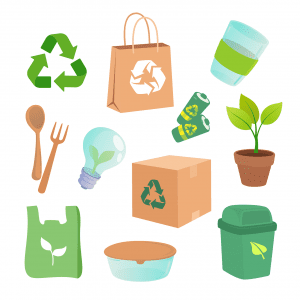Making Democracy Work: Reducing waste should be a regional effort
By Nancy Marr
There is substantial agreement among environmental groups that we want a circular economy — that is, we want to reduce waste by all means possible — by reducing, re-using, repairing, and recycling our waste — so that there is none, arriving at “zero waste.”
The DEC has just released a draft solid waste management plan designed to help New York State meet the climate goals of the Climate Leadership and Community Protection Act, passed in 2019. It proposes reducing waste at its source, returning materials back to productive use, and diverting waste from landfills to avoid the emission of greenhouse gases, reaching a reduction of emission by 85% by 2050. The DEC has also issued rules requiring that any facility with over 25 pounds of food scraps either donate it or take it to a designated site for recycling. (Suffolk County has only one food-recycling site, so that requirement has been waived, leaving the food in the landfill.)
 Because waste removal is a town responsibility, there has been no movement toward creating a county role which could be funded by the DEC, along with its role of regulating and overseeing town operations. Much of the municipal waste in Suffolk County is incinerated, with the ash deposited in landfills in the towns of Brookhaven and Babylon. Towns without landfills are sending their waste off the island to other states, using trucks with high rates of carbon fuel emission. Construction and demolition waste from building projects, and yard waste have been recycled more successfully, except for glass, which is currently part of municipal waste. It is being studied as a subject for recycling if markets can be developed for its final stage.
Because waste removal is a town responsibility, there has been no movement toward creating a county role which could be funded by the DEC, along with its role of regulating and overseeing town operations. Much of the municipal waste in Suffolk County is incinerated, with the ash deposited in landfills in the towns of Brookhaven and Babylon. Towns without landfills are sending their waste off the island to other states, using trucks with high rates of carbon fuel emission. Construction and demolition waste from building projects, and yard waste have been recycled more successfully, except for glass, which is currently part of municipal waste. It is being studied as a subject for recycling if markets can be developed for its final stage.
A conference held recently (by the Evan R. Liblit Memorial Scholarship Committee) at Stony Brook University with speakers on waste to energy efforts, large scale organics management, and funding through the Inflation Reduction Act, ended with a roundtable of four of the town supervisors in Suffolk County and a representative from the NYS Department of Energy Conservation who welcomed the attendance of the town supervisors and commented on the unusually large number of people in attendance, showing a growing concern with the issue of waste reduction.
The town supervisors who participated in the conference — from Brookhaven, Smithtown, Islip, and Babylon — all agreed that they communicate regularly about issues of waste and are taking steps to reduce it but they said they cannot do it alone. How do we create and implement a regional or county approach? Most of the town supervisors reported that the residents of their towns are not aware of the problem and their part in it. To reduce our emissions by 2050 will require an accurate calculation of how the population is growing and the amount and nature of the waste.
Concern about the waste problem is most often expressed by residents objecting to measures taken to deal with the problem. In Smithtown the plan to utilize rail lines to move the waste to other states has met with opposition to the idea of railroad areas, despite the fact that it would reduce the emissions from trucks from the road and reduce road traffic. In Brookhaven, plans by Winters Brothers for removing ash by rail have also been opposed. How would people react to increases in garbage collection rates if more towns implement a Pay-as-You-Throw program, although many areas of the country now use it, substantially reducing the trash they pick up.
The supervisors cited successful efforts by teachers and schools to build understanding of the waste crisis, but how can we do more?
Community groups are leading efforts to create community composting for our farmlands, open repair cafes, and create anaerobic digesters. Small groups of concerned citizens meet regularly as Carbon Crews, to learn new ways of reducing their footprints. Larger organizations, such as Beyond Plastics, have publicized the dangers of producing and burning plastics and are working on state regulations (Extended Producer Responsibility) to make producers aware of the costs to municipalities of disposing of the waste their products create.
We can all do more, at home and away. If each of us cannot throw away less, little will be accomplished. Watch the DEC webinar to be held on April 11 from 10 to 11:30 a.m. to describe the Draft New York State Management Plan. For more information go to https://www.dec.ny.gov/chemical/41831.html
Nancy Marr is vice-president of the League of Women Voters of Suffolk County a nonprofit, nonpartisan organization that encourages the informed and active participation of citizens in government and influences public policy through education and advocacy. For more information, visit https//my.lwv.org/new-york/suffolk-county.







